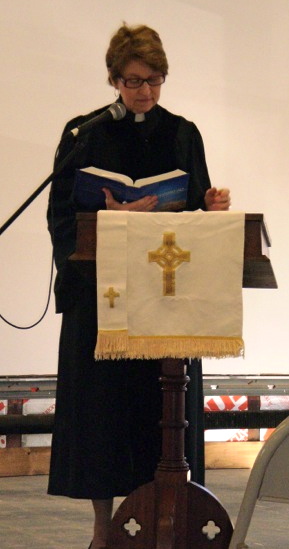Are PC(USA) Ties to Humana a Possible Obstacle to Divestment?
By Rev. Bebb Wheeler Stone, PhD View and Print as PDF.
View and Print as PDF.
 On July 7th, 2012, the Presbyterian Church (U.S.A.) became “the first major institution to take steps towards divestment from private health insurance.”[1] But a possible conflict of interest may cause the church to reconsider.
On July 7th, 2012, the Presbyterian Church (U.S.A.) became “the first major institution to take steps towards divestment from private health insurance.”[1] But a possible conflict of interest may cause the church to reconsider.
The PC(USA) 220th General Assembly, recently concluded in Pittsburgh PA, voted approval of a resolution from Committee 21 (Health Issues) instructing Mission Responsibility Through Investment (MRTI) to request information and explanations of health insurance company policy and practices of for-profit health insurance corporations; to ensure the Board of Pensions health plan complies with the high standards we expect of others; to evaluate variance between church principles and corporate practices, assess possibilities of significant change in corporate behavior, and recommend appropriate measures to the Presbyterian Mission Agency, including possible divestment; to report to the next two General Assemblies (2014 and 2016) on actions taken; and to continue to support the single payer model of health care reform.
The primary objective is to assess whether such companies operate consistently with our corporate engagement policy. If inconsistencies are found by MRTI, the General Assembly would have to determine what actions are necessary to restore consistency or—if the corporate practices and objectives of these corporations had become so entrenched—that no other option were available except the severing of ties through divestment.
___________________________________________
Do we really have the courage to investigate our own?
___________________________________________
The five most important for-profit health insurance corporations are Cigna, Aetna, Wellpoint, United Healthcare, and Humana (all of which are also healthcare service providers). With that last corporation name, we name our family dilemma.
When our church reunited in 1983 and merged two separate headquarters (New York and Atlanta) into one in Louisville, the Presbyterian Church (U.S.A.) accepted a gift: the opportunity to lease for $1/year two adjacent warehouses owned by the Humana Corporation, which we redeveloped into our 100 Witherspoon Street national office. The gift meant that after the ten-year lease, the building’s title would be transferred to the PC(USA).[2]
It was at the PHEWA (Presbyterian Health, Education, and Welfare Association) 2006 New Orleans Biennial that Teaching and Ruling Elders, to my knowledge, first began to work assiduously on behalf of reforming the United States health care system by the method known in shorthand as “single payer.” “Single payer” would essentially expand and improve the healthcare coverage now enjoyed by U.S. citizens age 65 and over (i.e. Medicare), which is cost effective (3% administrative overhead) and greatly appreciated by those who are now covered by it. “Single payer” is not socialized medicine, in which the doctors work for the government as their employer. “Single payer,” as it is envisioned in its legislative form (H.R. 676), is privately delivered, but publicly funded. That is, the federal government steps in as the insurer, displacing the insurance companies that are now making enormous profits for acting as middlemen, gatekeepers, and profit-takers. Some health insurance companies deliver no health care whatsoever.
The next year, in 2007, an informal group of Teaching and Ruling Elders in the Pittsburgh Presbytery[3] began to meet and discuss health care reform. Meeting once a month over lunch, they developed an overture to the 218th General Assembly (2008) calling “single payer” health care reform a “moral imperative.” The team asked for, and received, time on three separate presbytery meeting dockets in order to educate the presbytery on the merits of single payer. When it was approved, Ruling Elder Hal Sanders, a retired hospital administrator, was asked to serve as Pittsburgh Presbytery’s Overture Advocate to the Health Issues Committee. The Committee was so engaged by Hal’s professional expertise and knowledgeable experience that they kept him in a “Question and Answer” session for an hour. The Committee voted to send the resolution to the plenary.
The General Assembly approved the resolution, going on record in support of “single payer.” The resolution also included $25,000 to fund ten regional educational seminars to interpret “single payer” to a wider audience. Teaching Elder David Bos, for PHEWA, administered the distribution of the $25,000 grant, funding well-organized seminars across the nation.
___________________________________________
So, while the 2011 Affordable Care Act is the constitutional law of the land, the Presbyterian Church (U.S.A.) is on record supporting further reforms until health care is universal, privately delivered, and publicly funded.
___________________________________________
During 2009, in Louisville, Teaching Elder David Bos and Organizer Kay Tillow, among others, brought public critique to bear against the Humana Corporation for corporate practices. David, Kay, and others participated in demonstrations outside Humana’s corporate headquarters from the back of a red pickup truck equipped with a sound system.
And herein lies our dilemma: Humana’s corporate leadership includes Presbyterians active in congregations with PC(USA) leaders and members. These people are us. That begs the question: do we really have the courage to investigate our own? With an eye to divestment? How will this affect relationships? With all the “reductions in force” at 100 Witherspoon Street, the once-bustling office has thousands of square feet of space advertised for rent. Perhaps Humana would like to rent space in the building it once owned?
It is awkward to criticize any corporation whose leaders are members of our community. But isn’t that precisely what we must sometimes do for the sake of the integrity of our witness to the love, power, and justice of Jesus Christ? We must stare at ourselves at the mirror and ask the hard questions. Our Lord of lords expects it.
So, while the 2011 Affordable Care Act is the constitutional law of the land, the Presbyterian Church (U.S.A.) is on record supporting further reforms until health care is universal, privately delivered, and publicly funded. The Stated Clerk of the Presbyterian Church (U.S.A.), Gradye Parsons, issued a statement the day after the Supreme Court’s decision finding the Affordable Care Act to be constitutional, in which he expressed gratitude for a necessary good beginning, but then twice mentioned the General Assembly’s call for “single payer.”
See more articles like this one from the Oct 2012 issue, “The Backstory of General Assembly”
Notes
[1] Katie Robbins, “Health Care Workers, Patients Lead Fight for Divestment from Corrupt Private Health Insurance Industry: Presbyterian Church and TIAA-CREF Hear Their Call,” Unbound: August 8, 2012.
[2] Associated Press, Houston Chronicle, June 17, 1987.
[3] Rev. Bill Thomas, Rev. Don Dutton, Rev. Darcy Hawk, Rev. Bebb Stone; Teaching Elders Hal Sanders, Claudia Detwiler, and Dr. Tom Graham.







Unbound Social